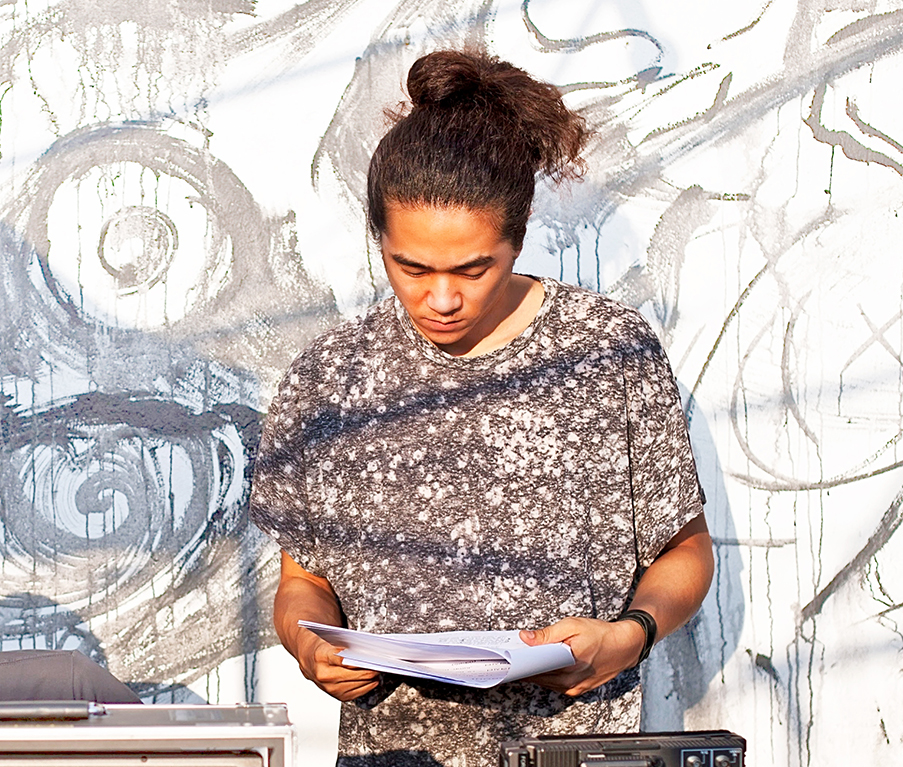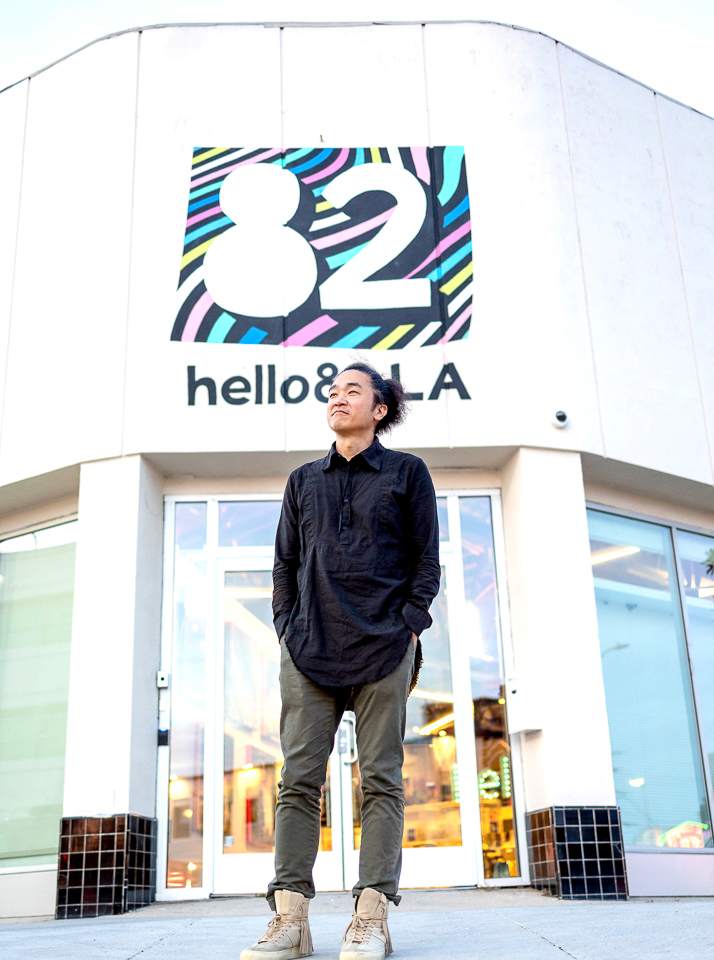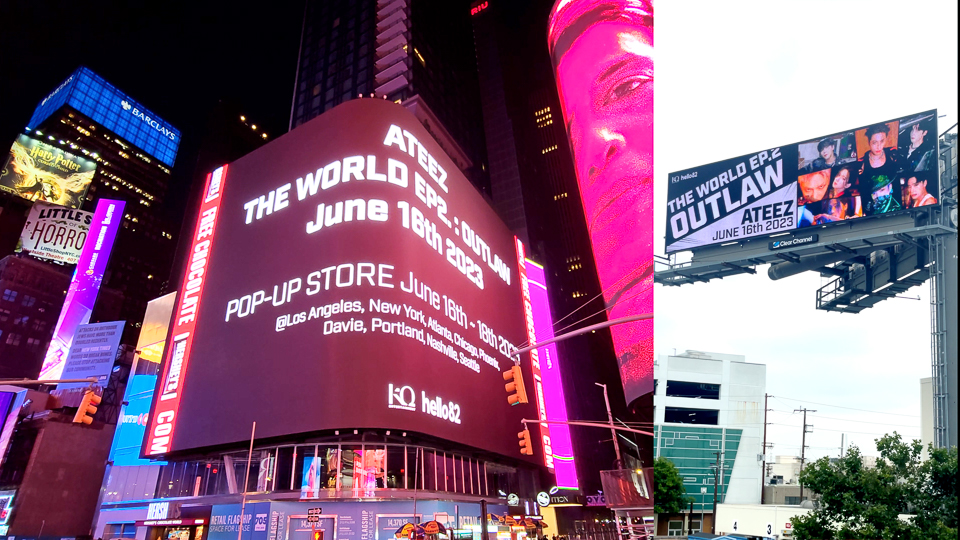- writing date 2024.10.02
- author Communication Team
- hits 3
CEO of Hello82
Jaeyoon Choi
(Spanish Language & Linguistics, ‘96)
now at the center of the K-pop industry

In the 2010s when K-pop emerged as a cultural product representing Korea, its international popularity initially stemmed from a niche group of enthusiasts in South America and Europe. However, the influence of K-pop idols grew day by day, transcending specific regions and leading to the formation of a global fandom. At that time, Choi Jaeyoon, who was a producer of music programs, recognized this fervor early on and founded Hello82, a fan-oriented K-pop content distribution company. ATEEZ, a boy group that ventured into the US market under the auspices of Hello82, achieved the #1 spot on the Billboard 200 chart thanks to its sophisticated local promotional strategy. Subsequently, they proudly stood on the stage of Coachella, one of the three biggest music and arts festivals in the US.
Q. Recently, artists for whom Hello82 is in charge of distribution have achieved consecutive successes on the Billboard charts, and I heard the news that you are expanding your business to Europe.
I'm curious if there are any other updates.
A. Hello82 is a US-based company that primarily operates in the US and European markets. In the US, we're working on expanding our scale, and in Europe, we're gradually expanding as well.
Q. When did you first become interested in music?
A. I’ve listened to music since I was very young. From the age of 6, I grew up mostly listening to English-language music. During my high school years, I fell in love with Luis Miguel's music, which I happened to hear at the Tower Records store in Gangnam Station. I wanted to know more, so I developed a desire to learn the Spanish language and Spanish literature at college.
Q. Were there any particularly memorable episodes during your time at Korea University?
A. I spent most of my time at the Korea University Educational TV Station (KUTV). I filmed documentaries and made music videos, but more than that, I had a lot of fun hanging out with my peers. At the time, people aiming for broadcasting jobs were preparing for the so-called Eonron-Goshi (an abbreviated term that collectively refers to the exams that must be passed in order to join newspaper/media companies as a journalist). But KUTV was a place where people who were deeply into creative videos gathered, rather than those focused on this exam. My time at KUTV naturally presented me with an opportunity to informally learn about music, video, media and more. It's probably the place that produced the most (or most famous) producers, anchors and directors at Korea University.

"There is nothing we can’t do in the world.
Thing have never been easier for Koreans and the Korean culture.
We will find a way, once we get to work on it."
Q. The programs you produced at Mnet, your first workplace, and later at Dingo Studios (Off the Record, Hyori; 2NE1 TV, Goosebump Live of Ordinary People; Vertical Live; among others) were all received very well. How did your thinking evolve in creating such great successes?
A. I worked as a music program producer at Mnet for 10 years, and then in 2011 I was suddenly dispatched to the US. At that time, online-based content and media were growing at a tremendous speed, so my career focal point also shifted from TV to new media. I realized that virality* was the key to the new media. I believed that content that could resonate with viewers and their peers was the most important thing, and after returning to Korea, I moved to a startup company and created Dingo Studios to produce new media content.
* virality: the phenomenon of content spreading enormously rapidly across the internet
Q. What were the motivations that made you start a new venture with the K-pop content distribution company Hello82?
A. When I first went to the US as a producer at Mnet in 2011, it was even before Psy's Gangnam Style (2012) was released, but due to the influence of YouTube, videos from SM Entertainment and YG Entertainment were already going viral though on a smaller scale. At that time, I decided to target the US market because there were no businesses focusing on K-pop there. With a team of less than ten people, we set out to center Mnet America’s go-to-market strategy on K-pop, and created the K-pop convention KCON. But it seems like this initiative came too early. I wanted to try again properly after spending some time back in Korea. Dingo Studios also started with a focus on overseas business, but after 2-3 years, I came to conclude that I needed to focus solely on overseas business and that there was no need to focus on making connections between Korea and the US. In early 2018, BTS was growing in the US after the success of Big Bang, but there were still no businesses specializing in K-pop, just like in 2011. So I decided to start Hello82 in the US. ‘82’ is taken from Korea's telephone country code.

Billboards advertising ATEEZ’s album and the pop-up store themed after the boy group
Q. Excluding major agencies, you are the only one to have helped an idol group, ATEEZ, to the top of the Billboard 200. What was Hello82’s strategy behind this success?
A. The concepts of major agencies and record labels all originated within Korea. These concepts don't work in the US and other countries, and international fans don't care about whether their favorite idol groups are from major agencies or smaller ones. And international fans, as long as they like K-pop, tend to support all K-pop artists. Our business focuses on serving these fans in various countries based on the understanding of these characteristics of theirs. We're the only ones doing business in a way that's optimized solely for K-pop fans, and that’s why we are attracting them. And because the fan base is growing, we grow, too.
Q. What are the current industry trends in K-pop? Are you working on any new projects?
A. In the US, the demand is still outweighing the supply, so the marketing is likely to continue to grow. One global mega-trend is that a wide variety of sub-cultures and niche cultures have been emerging and intermingling with each other. This presents a huge opportunity for K-pop, whose formula for success has lain in online virality.
Q. Could you tell us about Hello82's future plans or goals?
A. Currently, Hello82 is playing a role as a content export platform, vertically integrating K-pop labels, distribution, merchandise and events in the US and Europe. In the future, we plan to expand into other areas that we can develop, while being continuously dedicated to K-pop fans. Furthermore, we might try a fan-centric culture business outside of K-pop. For example, we might see the birth of Hello52, 52 being Mexico’s country code, as Mexican music is now becoming the hottest in the world.